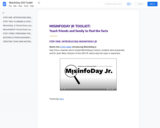
MisinfoDay Toolkit: Teach friends and family to find the facts.
- Subject:
- Applied Science
- Education
- Information Science
- Material Type:
- Activity/Lab
- Lesson Plan
- Provider:
- University of Washington Center for an Informed Public
- Date Added:
- 07/13/2021

MisinfoDay Toolkit: Teach friends and family to find the facts.
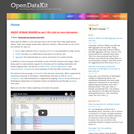
Open Data Kit (ODK) is an open-source suite of tools that helps organizations author, field, and manage mobile data collection solutions. Our goals are to make open-source and standards-based tools which are easy to try, easy to use, easy to modify and easy to scale. To this end, we are proud members of the OpenRosa Consortium and active participants in the JavaRosa project.
ODK's core developers are researchers at the University of Washington's Department of Computer Science and Engineering department and active members of Change, a multi-disciplinary group at UW exploring how technology can improve the lives of under-served populations around the world.

Short Description:
Our hope is that this guide to citing personal experience and interviews meets our goal of supporting students to produce their own knowledge, as well as honoring the academic value of their lived experience and the experiences of their families and communities. Through the use of a set of guidelines we created for students to cite personal experience and interviews, we found students self-reported increase in engagement and success in academic assignments. We propose this set of guidelines are an important practical tool for critical, feminist, and anti-racist pedagogy, as well as a method for teaching ethical research.
Word Count: 33232
(Note: This resource's metadata has been created automatically by reformatting and/or combining the information that the author initially provided as part of a bulk import process.)
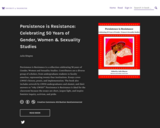
Short Description:
Persistence is Resistance is a collection celebrating 50 years of Gender, Women and Sexuality Studies. Contributors are a diverse group of scholars, from undergraduate students to faculty emeritus, representing twenty-four institutions. Essays cover GWSS’s history, praxis, and implementation. The book also includes artwork by GWSS undergraduates and alumni, and their answers to “why GWSS?” Persistence is Resistance is ideal for the classroom because the essays are short, jargon light, and inspire feminist inquiry, activism, and pride.
Long Description:
Persistence is Resistance: Celebrating 50 Years of Gender, Women & Sexuality Studies is an open access book with pdf available for download. This collection includes contributions from a diverse group of Gender, Women, and Sexuality Studies (GWSS) scholars, from undergraduate students to faculty emeritus, representing twenty-four different institutions. The Introduction is by Beverly-Guy Sheftall and there are twenty short essays on the following topics: history of the first program (SDSU); Africana Women’s Studies; GWSS in the Global South; the women’s studies name change; the urgency of GWSS; an annotated bibliography on the history of GWSS; feminist pedagogy and praxis; feminist publishing; institutional battles; feminist administrating; getting jobs with a GWSS major; an undergrad’s reflection on GWSS; GWSS in Ghana; feminism in Latin America; Indigenous feminisms; ecofeminism; GWSS and community colleges; and Chanel Miller’s Know My Name. Every author is either presently teaching in a GWSS program and/or has at least one of their degrees in GWSS. The essays are punctuated by artwork from GWSS undergraduates and alumni, and their short answers to why they chose GWSS. It is ideal for the classroom because the essays are short, jargon light, and meant to inspire feminist inquiry, activism, and pride.
Word Count: 63498
ISBN: 979-8-218-03298-2
(Note: This resource's metadata has been created automatically by reformatting and/or combining the information that the author initially provided as part of a bulk import process.)
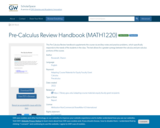
This Pre-Calculus Review handbook supplements via ancillary notes and practice problems from the OER textbooks 1. Apex PreCalculus, 2. OpenStax Algebra & Trigonometry – 2nd edition
and 3. OpenStax PreCalculus – 2nd edition. The text allows for a greater synergy between the calculus and pre-calculus portions of the course.
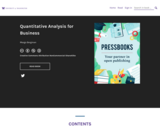
The objectives of this course are as follows: Demonstrate an understanding of graphical representations of data and their interpretation; Demonstrate a competency in mathematical tools of decision making, including derivatives and analytical optimization; Demonstrate an understanding of descriptive statistics, hypothesis testing, and the theory of regression; Demonstrate competency in the use of software used in quantitative analysis, including Excel tools and statistical software. This textbook is organized to support you in these goals. The textbook is adapted from Contemporary Calculus, written by Dale Hoffman from Bellevue Community College and Business Calculus written by Shana Calaway from Shoreline Community College. New material is written by Margo Bergman from University of Washington Tacoma.

Short Description:
What is the place of sports at a university? Students share what they learned about sports of all kinds on campus. From 'built' & 'natural' environment sports, to esports, recreational activities, intramural, club, and spectator sports, students share stories of how sports influence the college going experiences of campus life. Cover Photo Credit: Dennis Wise/University Photography
Word Count: 21855
(Note: This resource's metadata has been created automatically by reformatting and/or combining the information that the author initially provided as part of a bulk import process.)
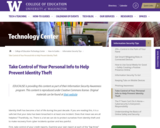
Identity theft has become a fact of life during the past decade. If you are reading this, it is a safe bet that your data has been breached in at least one incident. Does that mean we are all helpless? Thankfully, no. There is a lot we can do to protect ourselves from identity theft and to make recovery from cyber incidents quicker and less painful.
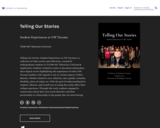
Student Experiences at UW Tacoma
Short Description:
Telling Our Stories: Student Experiences at UW Tacoma is a collection of video stories and reflections, created by undergraduate students in TCOM 347: Television Criticism & Application. Students worked in teams to document and produce short digital stories highlighting the experiences of other UW-Tacoma students with regards to one or various aspects of their identity, whether related to race, ethnicity, class, gender, sexuality, disability, place of origin, etc. With the goal of understanding how students' identity, and overall way of seeing the world, affect their college experience. Through this work, students engaged in conversation about their own social identities and their positionality in relationship to the people they are interviewing.
Long Description:
The Telling Our Stories project is designed so students work in teams to document and produce short digital stories highlighting the experiences of other UW-Tacoma students with regards to one or various aspects of their identity, whether related to race, ethnicity, class, gender, sexuality, disability, place of origin, etc. The goal is to understand how student’s identity, and overall way of seeing the world, affect their college experience, whether in the classroom or on other spaces across campus.
Through this course, students have engaged in conversation about their own social identities and their positionality in relationship to the people they are interviewing. The project employs different elements of pre-production, production and post-production, skills the students have begun to learn through this class. In addition to the videos, students have also developed this online platform where the work can be viewed and made accessible to the public.
Word Count: 6820
(Note: This resource's metadata has been created automatically by reformatting and/or combining the information that the author initially provided as part of a bulk import process.)
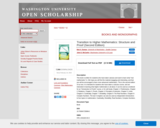
This book is written for students who have taken calculus and want to learn what “real mathematics" is. We hope you will find the material engaging and interesting, and that you will be encouraged to learn more advanced mathematics. This is the second edition of our text. It is intended for students who have taken a calculus course, and are interested in learning what higher mathematics is all about. It can be used as a textbook for an "Introduction to Proofs" course, or for self-study. Chapter 1: Preliminaries, Chapter 2: Relations, Chapter 3: Proofs, Chapter 4: Principles of Induction, Chapter 5: Limits, Chapter 6: Cardinality, Chapter 7: Divisibility, Chapter 8: The Real Numbers, Chapter 9: Complex Numbers. The last 4 chapters can also be used as independent introductions to four topics in mathematics: Cardinality; Divisibility; Real Numbers; Complex Numbers.

Exploring Neuroscience and Neurotechnologies at Home
Word Count: 13512
(Note: This resource's metadata has been created automatically by reformatting and/or combining the information that the author initially provided as part of a bulk import process.)

Exploring Neuroscience and Neurotechnologies at Home
Word Count: 13450
(Note: This resource's metadata has been created automatically by reformatting and/or combining the information that the author initially provided as part of a bulk import process.)

Exploring Neuroscience and Neurotechnologies at Home
Word Count: 13394
(Note: This resource's metadata has been created automatically by reformatting and/or combining the information that the author initially provided as part of a bulk import process.)

Exploring Neuroscience and Neurotechnologies
Word Count: 12833
(Note: This resource's metadata has been created automatically by reformatting and/or combining the information that the author initially provided as part of a bulk import process.)